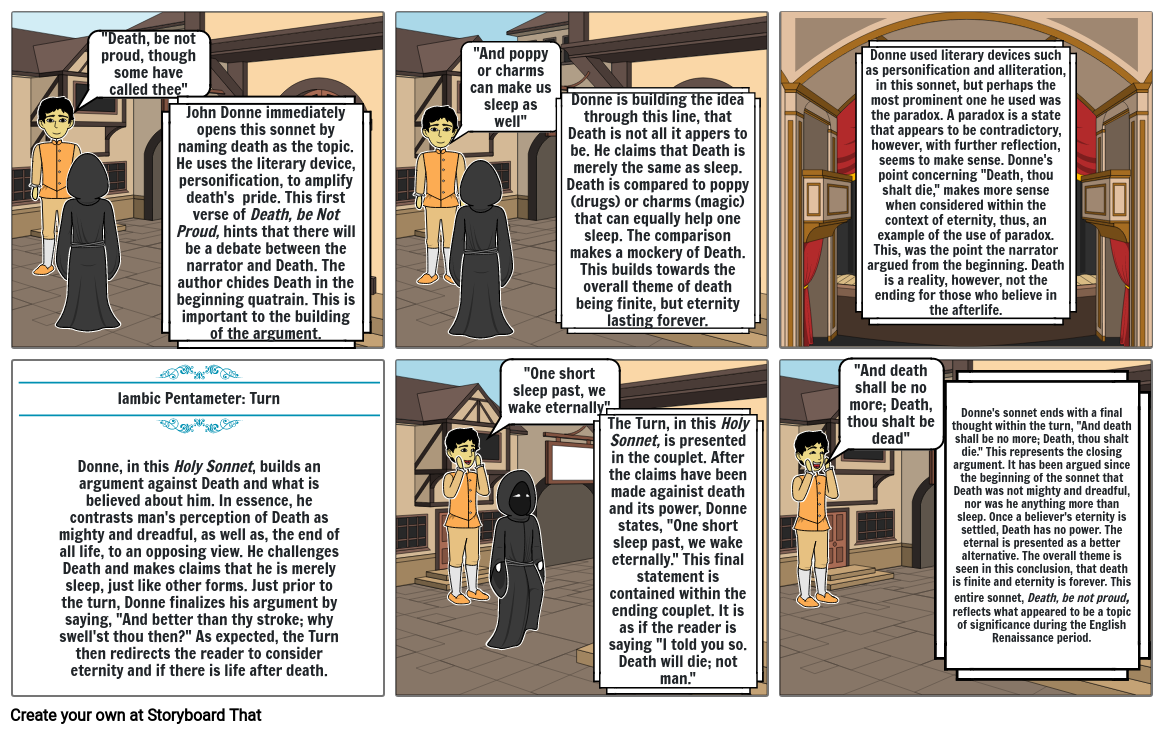unit 4 portfolio

Storyboard Tekst
- "Death, be not proud, though some have called thee"
- John Donne immediately opens this sonnet by naming death as the topic. He uses the literary device, personification, to amplify death's pride. This first verse of Death, be Not Proud, hints that there will be a debate between the narrator and Death. The author chides Death in the beginning quatrain. This is important to the building of the argument.
- "And poppy or charms can make us sleep as well"
- Donne is building the idea through this line, that Death is not all it appers to be. He claims that Death is merely the same as sleep. Death is compared to poppy (drugs) or charms (magic) that can equally help one sleep. The comparison makes a mockery of Death. This builds towards the overall theme of death being finite, but eternity lasting forever.
- Donne used literary devices such as personification and alliteration, in this sonnet, but perhaps the most prominent one he used was the paradox. A paradox is a state that appears to be contradictory, however, with further reflection, seems to make sense. Donne's point concerning "Death, thou shalt die," makes more sense when considered within the context of eternity, thus, an example of the use of paradox. This, was the point the narrator argued from the beginning. Death is a reality, however, not the ending for those who believe in the afterlife.
- Iambic Pentameter: Turn
- Donne, in this Holy Sonnet, builds an argument against Death and what is believed about him. In essence, he contrasts man's perception of Death as mighty and dreadful, as well as, the end of all life, to an opposing view. He challenges Death and makes claims that he is merely sleep, just like other forms. Just prior to the turn, Donne finalizes his argument by saying, "And better than thy stroke; why swell'st thou then?" As expected, the Turn then redirects the reader to consider eternity and if there is life after death.
- "One short sleep past, we wake eternally"
- The Turn, in this Holy Sonnet, is presented in the couplet. After the claims have been made againist death and its power, Donne states, "One short sleep past, we wake eternally." This final statement is contained within the ending couplet. It is as if the reader is saying "I told you so. Death will die; not man."
- "And death shall be no more; Death, thou shalt be dead"
- Donne's sonnet ends with a final thought within the turn, "And death shall be no more; Death, thou shalt die." This represents the closing argument. It has been argued since the beginning of the sonnet that Death was not mighty and dreadful, nor was he anything more than sleep. Once a believer's eternity is settled, Death has no power. The eternal is presented as a better alternative. The overall theme is seen in this conclusion, that death is finite and eternity is forever. This entire sonnet, Death, be not proud, reflects what appeared to be a topic of significance during the English Renaissance period.
Over 30 millioner storyboards opprettet

